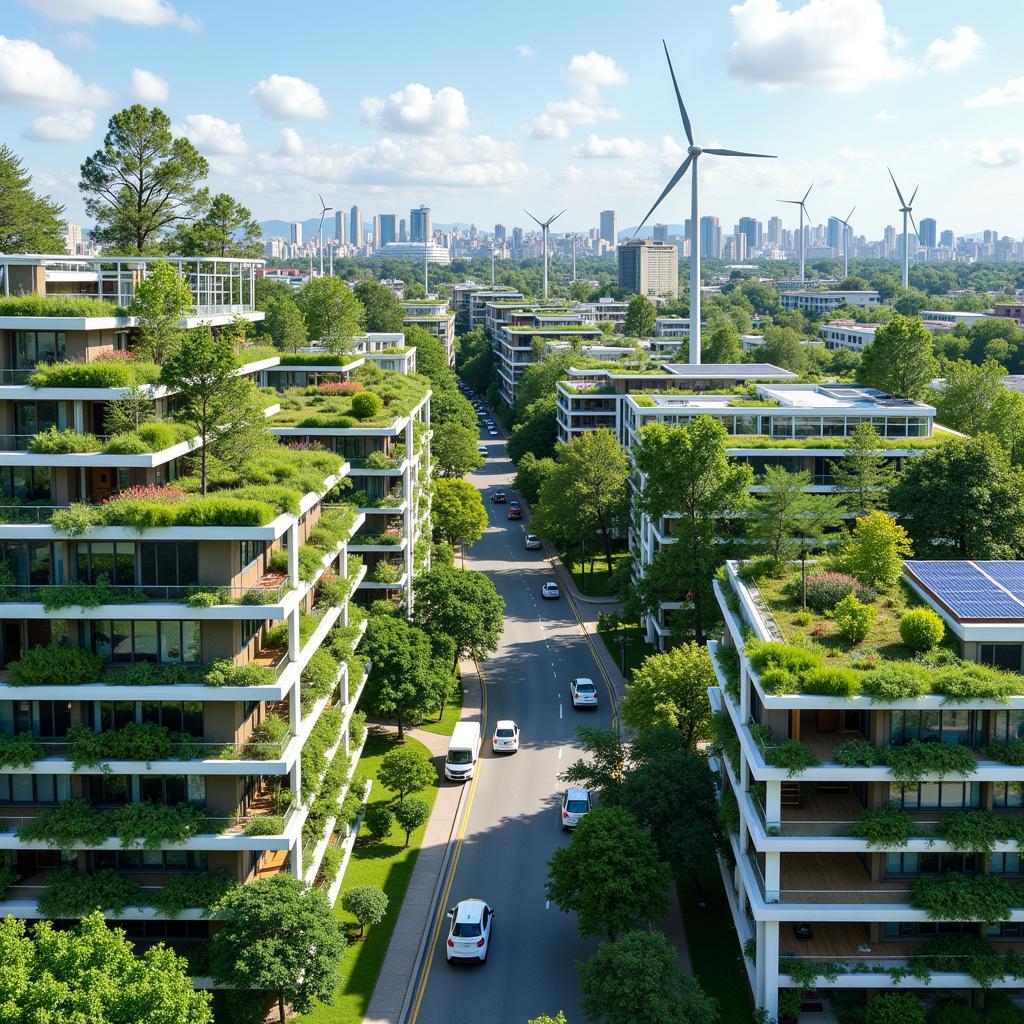An Environmentally Sustainable Society is a critical goal for humanity in the 21st century and beyond. This means creating a world where our actions meet the needs of the present without compromising the ability of future generations to meet their own needs, all while minimizing our impact on the planet’s ecosystems. This involves a fundamental shift in how we produce and consume, how we live and interact with nature, and how we govern and organize our societies. Learn more about how we can achieve this vital goal.
What Does an Environmentally Sustainable Society Look Like?
An environmentally sustainable society prioritizes ecological health and well-being alongside economic and social prosperity. It recognizes the interconnectedness of these three pillars and strives for a balance that ensures a thriving planet for all. This involves transitioning to renewable energy sources, reducing waste and pollution, conserving biodiversity, promoting sustainable agriculture, and fostering responsible consumption patterns. It also entails a commitment to social equity, ensuring that the benefits and burdens of sustainability are shared fairly among all members of society. For a deeper understanding of this concept, see our environmentally sustainable society definition.
Key Principles of an Environmentally Sustainable Society
Several key principles underpin the concept of an environmentally sustainable society:
- Renewable Energy Transition: Shifting from fossil fuels to renewable sources like solar, wind, hydro, and geothermal energy is paramount. This reduces greenhouse gas emissions and mitigates climate change.
- Circular Economy: Moving away from a linear “take-make-dispose” model to a circular economy, where resources are reused, repurposed, and recycled, minimizing waste and maximizing resource efficiency.
- Biodiversity Conservation: Protecting and restoring natural ecosystems, including forests, oceans, and wetlands, is crucial for maintaining biodiversity and the vital ecosystem services they provide.
- Sustainable Agriculture: Adopting farming practices that minimize environmental impact, such as reducing pesticide use, promoting soil health, and conserving water.
- Responsible Consumption: Making conscious choices about what we buy and use, prioritizing products and services that are environmentally friendly and socially responsible.
 Sustainable City with Green Buildings and Renewable Energy Sources
Sustainable City with Green Buildings and Renewable Energy Sources
How Can We Build an Environmentally Sustainable Society?
Building an environmentally sustainable society requires collective action at all levels – individual, community, national, and global. We all have a role to play in this transition.
Individual Actions for Sustainability
Each of us can contribute to a more sustainable future through simple yet powerful actions:
- Reduce, Reuse, Recycle: Minimize waste by reducing consumption, reusing items whenever possible, and recycling materials.
- Conserve Energy and Water: Adopt energy-efficient practices at home and choose water-saving appliances and fixtures.
- Choose Sustainable Transportation: Walk, bike, use public transportation, or carpool whenever possible. Consider switching to an electric or hybrid vehicle.
- Support Sustainable Businesses: Patronize businesses that prioritize environmental and social responsibility.
- Advocate for Change: Engage in political advocacy and support policies that promote sustainability.
“Individual actions, when multiplied across communities and nations, can create a powerful ripple effect towards a sustainable future,” says Dr. Amelia Carter, Environmental Sociologist at the University of California, Berkeley.
 Community Garden with Urban Farming and Local Produce
Community Garden with Urban Farming and Local Produce
The Role of Technology in Achieving Sustainability
Technology plays a vital role in driving the transition to an environmentally sustainable society. Innovations in renewable energy, energy storage, smart grids, and sustainable materials are key to achieving this goal. Furthermore, technology can enable more efficient resource management, reduce waste, and promote sustainable consumption patterns. You can find more information about building a sustainable society at what is an environmentally sustainable society.
Global Cooperation for Environmental Sustainability
International cooperation is essential for addressing global environmental challenges such as climate change, biodiversity loss, and pollution. International agreements and collaborations are crucial for sharing best practices, developing and implementing effective policies, and mobilizing resources to support sustainable development worldwide. Are you interested in learning more about local organizations working on sustainability? Check out the Missouri Native Plant Society.
“Global collaboration is not just an option, but a necessity for achieving a truly sustainable future,” emphasizes Dr. Jian Li, Director of the Institute for Sustainable Development at Peking University.
 Global Sustainability Summit with International Cooperation
Global Sustainability Summit with International Cooperation
Conclusion
Building an environmentally sustainable society is a complex but achievable goal. It requires a fundamental shift in our thinking and actions, embracing a holistic approach that integrates environmental, economic, and social considerations. By working together, individuals, communities, businesses, and governments can create a world where both humanity and nature thrive. For those interested in landscape architecture and sustainability, you can visit the Boston Society Landscape Architects. If you’re passionate about contributing to a more sustainable future and seeking career opportunities, you may be interested in Dish Society Careers.
FAQ
- What is meant by an environmentally sustainable society?
- What are the key principles of an environmentally sustainable society?
- How can individuals contribute to building a sustainable society?
- What is the role of technology in achieving sustainability?
- Why is global cooperation important for environmental sustainability?
- What are some examples of sustainable practices?
- How can we measure progress towards sustainability?
Need Help?
For further assistance or inquiries, please contact us at:
Phone: 02043854663
Email: societyforpeace@gmail.com
Address: Khu 34, Bac Giang, 260000, Vietnam.
Our customer service team is available 24/7 to support you.
 using WordPress and
using WordPress and